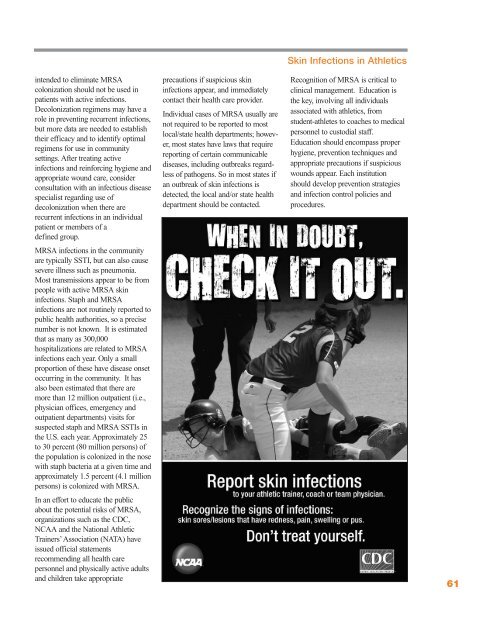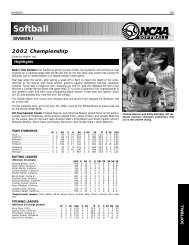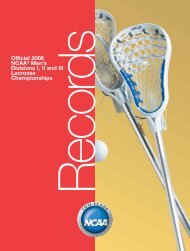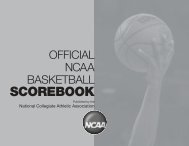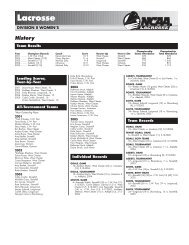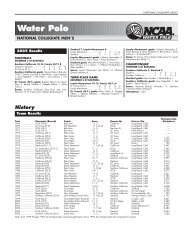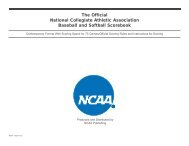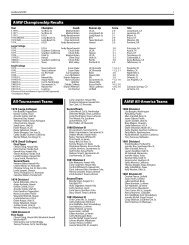Sports Medicine Handbook - NCAA
Sports Medicine Handbook - NCAA
Sports Medicine Handbook - NCAA
You also want an ePaper? Increase the reach of your titles
YUMPU automatically turns print PDFs into web optimized ePapers that Google loves.
intended to eliminate MRSA<br />
colonization should not be used in<br />
patients with active infections.<br />
Decolonization regimens may have a<br />
role in preventing recurrent infections,<br />
but more data are needed to establish<br />
their efficacy and to identify optimal<br />
regimens for use in community<br />
settings. After treating active<br />
infections and reinforcing hygiene and<br />
appropriate wound care, consider<br />
consultation with an infectious disease<br />
specialist regarding use of<br />
decolonization when there are<br />
recurrent infections in an individual<br />
patient or members of a<br />
defined group.<br />
MRSA infections in the community<br />
are typically SSTI, but can also cause<br />
severe illness such as pneumonia.<br />
Most transmissions appear to be from<br />
people with active MRSA skin<br />
infections. Staph and MRSA<br />
infections are not routinely reported to<br />
public health authorities, so a precise<br />
number is not known. It is estimated<br />
that as many as 300,000<br />
hospitalizations are related to MRSA<br />
infections each year. Only a small<br />
proportion of these have disease onset<br />
occurring in the community. It has<br />
also been estimated that there are<br />
more than 12 million outpatient (i.e.,<br />
physician offices, emergency and<br />
outpatient departments) visits for<br />
suspected staph and MRSA SSTIs in<br />
the U.S. each year. Approximately 25<br />
to 30 percent (80 million persons) of<br />
the population is colonized in the nose<br />
with staph bacteria at a given time and<br />
approximately 1.5 percent (4.1 million<br />
persons) is colonized with MRSA.<br />
In an effort to educate the public<br />
about the potential risks of MRSA,<br />
organizations such as the CDC,<br />
<strong>NCAA</strong> and the National Athletic<br />
Trainers’ Association (NATA) have<br />
issued official statements<br />
recommending all health care<br />
personnel and physically active adults<br />
and children take appropriate<br />
precautions if suspicious skin<br />
infections appear, and immediately<br />
contact their health care provider.<br />
Individual cases of MRSA usually are<br />
not required to be reported to most<br />
local/state health departments; however,<br />
most states have laws that require<br />
reporting of certain communicable<br />
diseases, including outbreaks regardless<br />
of pathogens. So in most states if<br />
an outbreak of skin infections is<br />
detected, the local and/or state health<br />
department should be contacted.<br />
Skin Infections in Athletics<br />
Recognition of MRSA is critical to<br />
clinical management. Education is<br />
the key, involving all individuals<br />
associated with athletics, from<br />
student-athletes to coaches to medical<br />
personnel to custodial staff.<br />
Education should encompass proper<br />
hygiene, prevention techniques and<br />
appropriate precautions if suspicious<br />
wounds appear. Each institution<br />
should develop prevention strategies<br />
and infection control policies and<br />
procedures.<br />
61


